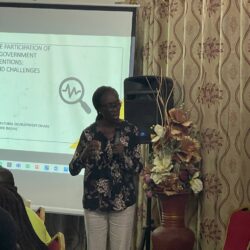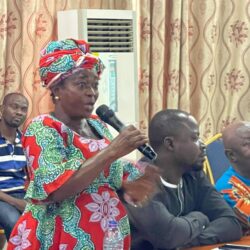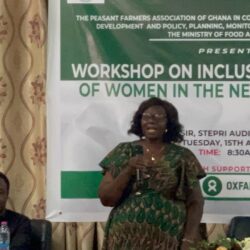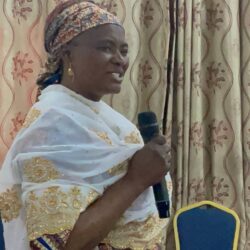Women play a significant role in agricultural development in Ghana, irrespective of the numerous challenges that prevent them from achieving their potential production. Some challenges, such as social and cultural norms that disadvantage them from achieving their potential, poor access to productive resources, and a low level of education, have negatively impacted their activities, leading to low productivity and low incomes for women farmers. The Ministry of Food and Agriculture (MoFA) developed the Gender and Agriculture Development Strategy (GADS I and II) to address these challenges; unfortunately, its implementation failed to address their critical problems and concerns that hampered their productivity.
While the introduction of Planting for Food and Jobs (PFJ) has contributed to agricultural growth through input subsidies, critical constraints confronting women were not deliberately addressed in its implementation. Given the central role of women in agricultural development and the revision of the PFJ to focus on a guaranteed credit system through aggregators, it is PFAG’s expectation that women will be targeted as they dominate produce aggregation in Ghana.
It was against this backdrop that PFAG partnered with the Women in Agricultural Development Directorate (WIAD) and the Policy, Planning, Monitoring, and Evaluation Directorate (PPMED) of MoFA for women farmers, aggregators, researchers, and civil society organizations to deliberate on how to ensure effective participation of women in the PFJ 2.0.
The meeting provided an opportunity for women across the country to share their experiences and their expectations for PFJ 2.0. In the meeting, the Director of WIAD explained the role of women in the various government interventions and alluded to the fact that their constraints were far greater than those of their male counterparts, which requires urgent attention. The PPMED also explained the PFJ 2.0, which focuses on input credit systems through an aggregator model.
In contributing to the PFJ 2.0 presentation, stakeholders were unanimous that, given that women constitute the majority of aggregators and marketers of agricultural produce, they should be targeted and given a central role in the program’s implementation. The following recommendations were raised for consideration in PFJ 2.0:
- The selection criteria for aggregators in the PFJ 2.0 should be reviewed to ensure that women and existing smaller aggregators are not disadvantaged
- The aggregator selection criteria should be transparent and a quota (at least 40%) be reserved for women aggregators
- Selected aggregators should work with FBOs with at least 50% of women as members
- Women who are already aggregators should be empowered to take up the role of aggregator in their operational areas instead of allowing others to operate in such areas
- A financing scheme to fully resource women aggregators should be instituted
- Different aggregator models should be designed for various commodities. For instance, different criteria for those into perishable and that of the non-perishable commodities.
Subsequently, a delegation from PFAG engaged the sector minister, Hon. Bryan Acheampong, in his office after the workshop and presented their concerns to him. The meeting ended successfully, with the minister promising to ensure that existing aggregators were not shortchanged by outsiders or foreign traders. He further encouraged PFAG members to actively participate in the program which will be launched in the last month of August 2023.






leave a comment
You must be logged in to post a comment.